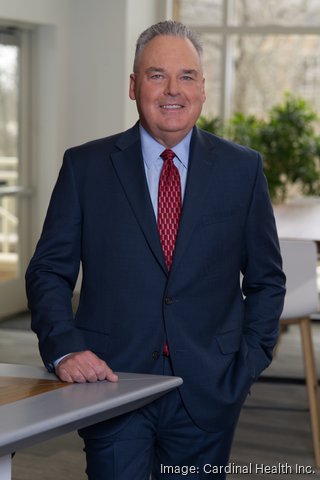Analysts were uncharacteristically blunt in Cardinal Health Inc.'s quarterly conference call Thursday, with more than one asking CEO Mike Kaufmann: Should the company dump its still-struggling medical supply division?
His answer in a word: No.
The questions weren't a surprise – although usually asked more privately, Kaufmann told Columbus Business First.
"You have a business that has taken down its guidance three quarters in a row, that’s not ideal," he said in an interview, blaming "unprecedented" inflation in commodities and transportation costs.
With one quarter to go this fiscal year, Cardinal (NYSE: CAH) reduced the upper end of its expected per-share earnings by 25 cents to a range of $5.15-$5.25, adjusted to exclude one-time items.
That's due to projecting an even greater decline in medical profits than it has warned of since January, after saying it wouldn't cut profit targets when supply chain woes surfaced in November. Its earliest guidance for the year had been as high as $5.90 per share.
Kaufmann said his job is to take a measured long-term view.
"I don’t want to react and make drastic moves because of a point in time," he said. "We still feel really good about this medical business over the long term and see potential growth."
The Dublin healthcare company missed analyst revenue projections for the third quarter ended March 31, at $44.8 billion, and recorded a net $97 million loss for the quarter because of a non-cash accounting move to write down $474 million in goodwill in the medical segment.
The division manufactures and distributes medical supplies such as gowns, gloves, masks and surgical instruments. Cardinal has raised prices on its in-house products and increased fees for outside manufacturers whose products it ships.
High supply chain costs are expected to persist into the next fiscal year staring July 1, CFO Jason Hollar said.
"We are focusing on future pricing flexibility for forces beyond our control," Kaufmann told analysts on the call.
That has meant reopening some two- and three-year contracts that had fixed pricing for an industry that's historically been stable, he said.
Cardinal also is leaving some international markets, overall reducing its global footprint by 50%, he said. It's simplifying operating models and improving efficiency with new facilities, including a glove factory and a distribution center it's building next to Columbus' Rickenbacker International Airport.
"We continue to aggressively review our cost structure," he said on the call. "We're confident in our ability to achieve our long-term targets."
The medical division is a smaller percentage of revenue but larger portion of overall profit than the much larger pharmaceutical distribution business. And it has had several ups and downs over the years, such as selling a product line for half of what it paid to acquire it.
Analyst Ricky Goldwasser of Morgan Stanley asked if the company explored "synergies" to combine pharmaceutical and medical distribution centers instead of building new. Kaufmann said they operate differently.
"What is the rationale to own a business on the medical side that has been underperforming for a very long time?" Goldwasser asked.
Cardinal continually assesses its portfolio and manages for shareholder value, Kaufmann responded.
"We feel good about where we are and where we're headed," he said.
Kaufmann told Business First inflationary impacts will wane over time, and meanwhile there are bright spots within the medical division, particularly a fast-growing business supplying in-home healthcare.
"More and more care is moving to the home," he said in the interview.
Also promising are laboratory, especially because of Covid-19 testing, and technology to track and manage inventory and freight.
The Rickenbacker distribution center replaces and doubles the size of a 1980s facility in Obetz. Cardinal has owned it since the 1998 acquisition of Chicago-area distributor Allegiance Healthcare to create the medical division.
Besides adding jobs in the region, Kaufmann said, it will better serve growing hospital systems in Ohio, an important market for Cardinal.
"That's a very old distribution center," he said. "You want to have great exciting places for your employees to come to work."
